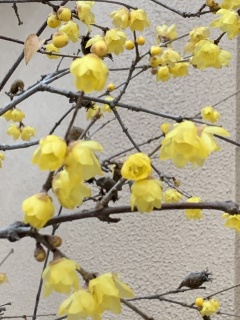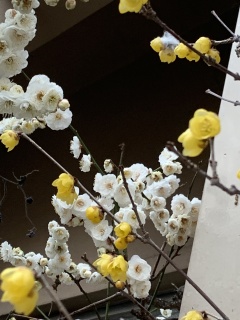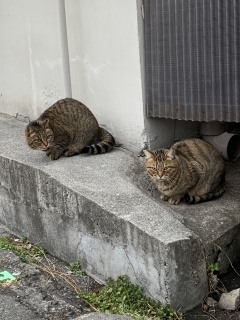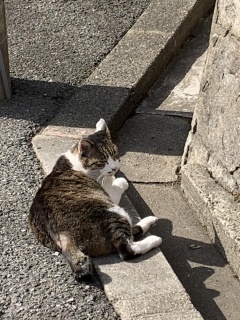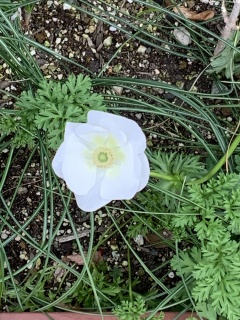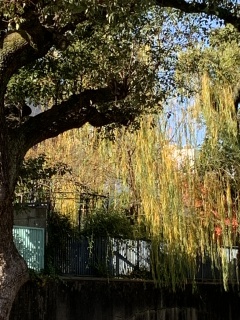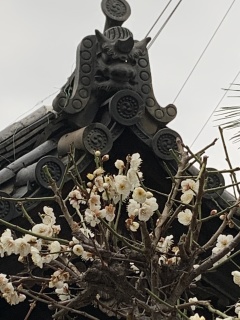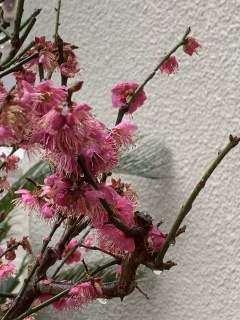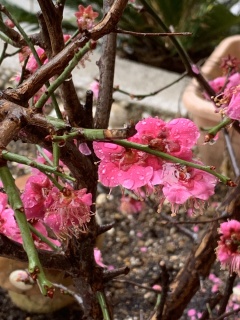I’m gonna have to start off yet again with “I’m way behind on comments but if you’ve posted something I’ve read it and been thinking of you,” which, though true, I feel should only hold a limited number of times. End-of-year busy, away for a night or two, sick for a while, winter hibernating tendencies, no genuine excuses. Posting right now a bunch of accumulated paragraphs because I have too much work to do and I don’t want to do it, so I am pretending I have time to do this… .
New Year’s cards not sent yet; expect them, well, in the New Year. (As noted in my last entry, if you’ve gotten one from me before expect one again unless you notify me otherwise; if you haven’t and you want one, let me know a name/address to use.)
More math workbook translation—there are numerous problems in which two brothers (or occasionally two sisters) leave the house at the same time and proceed at different paces toward the library or the station, and I can’t help wondering why they’re all on such bad terms, why not just walk or bicycle together and get there together? And are the younger brothers(/sisters)
old enough to be left to walk on their own? Also, there are problems like “express the relationship of these line segments etc. using symbols,” which always make me want to respond with “AB❤️C” or similar. I mean, it’s asking me about relationships!
A very old friend from college emailed me for the first time in something like twenty-five years to let me know he and his wife were visiting Japan and could we get together for lunch or something, so we did. We had a kind of difficult friendship in college (also I was, I think, unusual among his friends of any gender because I
didn’t ever go to bed with him), but we were close and it was really nice to sit down together and catch up on the last few decades, finding out that each of us is doing okay, knock wood, with some shared interests and many new experiences.
I’m still not 100% (I always get sick around New Year’s anyway, it’s just a thing, I’ve decided) but a definite improving factor was a big pot of lentil soup made from, I think,
trobadora’s recipe; I don’t know if it was the lentils or the paprika or the feta, but now I’m craving more of it. Also today a bowl of o-jiya for lunch; I like this very simple meal so much I put the recipe into a fic at some point, it’s just rice, tofu, egg, soup base, and sesame oil but
so good.
Yuletide fic safely posted before deadline; needs a little tweaking (and a new title and summary) before reveals, but holds together (although for anyone who knows me it might as well have my name signed all over it). I think this is going to be the first year when I just do my assignment and no treats or pinch hits, for the reasons above along with just generally drifting away from fic writing (though not giving it up altogether!). Still, looking forward to all the good reading.
Most Saturdays I go to the free Saturday juku a couple towns over to spend three hours with junior high schoolers and their English homework, which is sometimes fun and often frustrating (mostly not the kids’ fault, they’re all nice kids if wildly varying in ability and effort). Sometimes there’s a gap of time while they’re doing test/workbook questions on their own, and I use it to write in longhand; I got about half my Yuletide fic this year done that way, along with a lot of what I wrote for the Guardian wishlist, and today—with no remaining fic obligations—about 300 words of my original thing, which felt very satisfying. I hate longhand, but maybe I should do it more often. (For the record, my handwriting is so terrible that it serves as an effective cipher no matter who might look over my shoulder.)
Rereading Helen Thorpe’s
The Newcomers, an account of a year spent in an ESL classroom at a Colorado high school, with kids from the DRC, Burma, El Salvador, Mexico, Iraq, and various other countries, which is a lovely piece of writing (Thorpe is a terrific nonfiction writer in general), somewhat similar to another favorite, Brooke Hauser’s
The New Kids, about a Manhattan high school serving similar immigrants. So many individual stories worth knowing about. Also makes me think of the nighttime junior high near here, where I hang out in two classes; English for Class E, mostly Korean-born ladies with an average age somewhere in the sixties, many of them Japanese-Korean bilingual, some of them obviously very bright and deserving of the education they didn’t get to have (also one man of similar age with a Japanese name, who may be one of the people born roughly before 1965 with a physical disability who missed out on the special education schools first established in 1977). Also Japanese for Class B, three Nepali teenagers, a Chinese-Japanese kid from Guangdong, and two recently arrived older Korean ladies, none of them fluent in Japanese yet. The Nepali kids in particular (one boy with a bright grin and a mustache, three girls with long hair and little high light voices) are all on the ball and quick to learn, I don’t know if that’s a culturally acquired habit or if they’re just a particularly with-it random selection. Everyone makes the same mistakes we did when I was first studying Japanese, よんがつ for 4月, はいてください for 入ってください。
Not enough farmboy Chinese words accumulated yet to list here, but I was thinking how lucky it is for learning purposes that Chinese isn’t as gendered/socially inflected as Japanese. There are certainly some words the farmboys use that I (as a semi-respectable middle-aged lady) would probably not, but compared to their Japanese counterparts…look, let me give you a couple examples. (Vaguely sociolinguistic waffling follows)
I probably wouldn’t say 贼 as an intensifier or 不 alone as a tag question on the whole (although I could most likely get away with them in casual chat with A-Pei, for instance, it’s not like she hasn’t heard me say 特么 and other minced oaths anyway), but most of the language the farmboys use is something I could use too. Whether it’s me or Farmboy A, we can both get away (I think) with saying something like 我饿死了,吃饭吧 (I’m hungry, let’s eat) without drawing a second glance. On the other hand, Imaginary Japanese Farmboy A, talking to his peers, is probably going to say something like 腹へった、飯食おうぜ (hara hetta, meshi kuō ze) in that context, where I would say お腹空いた、ご飯食べようよ (onaka suita, gohan tabeyō yo). You will notice that although Imaginary Japanese Guy A and I are saying the same thing in the same language, there isn’t one word pronounced the same (kind of an extreme example, but then again I didn’t even put in any pronouns). This is one of the fun things about Japanese in its way, but I’m kind of glad for practical purposes the same does not apply (much) to Chinese… (Or am I wrong? Correct me if so!) Photos: Seasonal.






Be safe and well.





